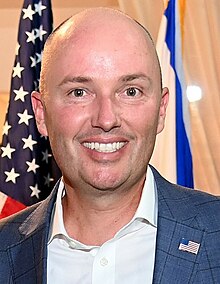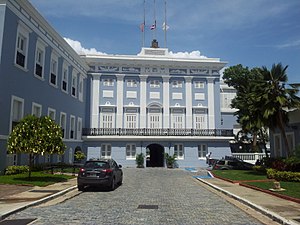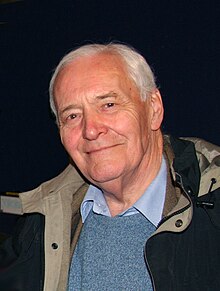
Back Portal:Politik ALS بوابة:السياسة Arabic بوابة:سياسة ARZ Портал:Политика Bulgarian প্রবেশদ্বার:রাজনীতি Bengali/Bangla Portal:Politika BS دەروازە:سیاسەت CKB Portál:Politika Czech Portal:Politik German Portal:Siyaset DIQ
| Main | Topics and categories | Tasks and projects |
The Politics portal
Politics (from Ancient Greek πολιτικά (politiká) 'affairs of the cities') is the set of activities that are associated with making decisions in groups, or other forms of power relations among individuals, such as the distribution of status or resources. The branch of social science that studies politics and government is referred to as political science.
They may be used positively in the context of a "political solution" which is compromising and non-violent, or descriptively as "the art or science of government", but also often carries a negative connotation. The concept has been defined in various ways, and different approaches have fundamentally differing views on whether it should be used extensively or in a limited way, empirically or normatively, and on whether conflict or co-operation is more essential to it.
A variety of methods are deployed in politics, which include promoting one's own political views among people, negotiation with other political subjects, making laws, and exercising internal and external force, including warfare against adversaries. Politics is exercised on a wide range of social levels, from clans and tribes of traditional societies, through modern local governments, companies and institutions up to sovereign states, to the international level.
In modern nation states, people often form political parties to represent their ideas. Members of a party often agree to take the same position on many issues and agree to support the same changes to law and the same leaders. An election is usually a competition between different parties.
A political system is a framework which defines acceptable political methods within a society. The history of political thought can be traced back to early antiquity, with seminal works such as Plato's Republic, Aristotle's Politics, Confucius's political manuscripts and Chanakya's Arthashastra. (Full article...)
Selected article
An Introduction to Animals and Political Theory is a 2010 textbook by the British political theorist Alasdair Cochrane. It is the first book in the publisher Palgrave Macmillan's Animal Ethics Series, edited by Andrew Linzey and Priscilla Cohn. Cochrane's book examines five schools of political theory—utilitarianism, liberalism, communitarianism, Marxism and feminism—and their respective relationships with questions concerning animal rights and the political status of (non-human) animals. Cochrane concludes that each tradition has something to offer to these issues, but ultimately presents his own account of interest-based animal rights as preferable to any. His account, though drawing from all examined traditions, builds primarily upon liberalism and utilitarianism.
Featured picture

The western (front) side of the United States Capitol. The U.S. Capitol serves as the location for Congress, the legislative branch of the U.S. federal government. It is located in Washington, D.C., on top of Capitol Hill at the east end of the National Mall. The building is marked by its central dome above a rotunda and two wings. It is an exemplar of the Neoclassical architecture style.
ImageSize = width:1600 height:auto barincrement:15
PlotArea = top:10 bottom:30 right:100 left:20
AlignBars = early
DateFormat = yyyy
Period = from:-210 till:220
TimeAxis = orientation:horizontal
ScaleMajor = unit:year increment:10 start:-210 (Full article...)
The attorney general of West Virginia is the chief legal advisor to the West Virginia state government and is the state's chief law enforcement officer. The office was created by Article VII, Section 1 of the first Constitution of West Virginia in 1863. Under the current state constitution (1872), the attorney general is an executive department-level state constitutional officer, along with the governor, secretary of state, auditor, treasurer, and commissioner of agriculture. The attorney general is the ex officio reporter of the Supreme Court of Appeals of West Virginia. The constitution further specifies that the attorney general shall reside in the seat of state government, Charleston, during their term of office. In Charleston, they are to maintain public records, books, and papers pertaining to their office, and perform all duties prescribed by state law. the attorney general receives a salary of $95,000 per year.
The attorney general gives their written opinions and advice upon questions of law to state officials, heads of state institutions, and prosecuting attorneys. They are also responsible for all litigation on behalf of the state government and state agencies and departments. The attorney general represents the state in all claims processed by the United States Court of Claims, prosecutes civil actions as prescribed by law, enforces the state consumer, antitrust, and preneed burial statutes, and enforces the West Virginia Human Rights Act and the West Virginia Fair Housing Act. The attorney general is also an ex officio member of the Board of Public Works, Council of Finance and Administration, Public Land Corporation, West Virginia Housing Fund, West Virginia Sheriff’s Bureau, Department of Public Safety Retirement Board, Bid Suspension Review Board, State Building Commission, Commission on Charitable Contributions, Women’s Commission, Multistate Tax Compact Advisory Committee, Records Management, and Preservation Advisory Committee. (Full article...)

Jesus College is one of the constituent colleges of the University of Oxford in England. The college was founded in 1571 by Queen Elizabeth I at the request of Hugh Price, a Welsh clergyman, who was Treasurer of St David's Cathedral in Pembrokeshire. The college still has strong links with Wales, and about 15% of students are Welsh. There are 340 undergraduates and 190 students carrying out postgraduate studies. Women have been admitted since 1974, when the college was one of the first five men's colleges to become co-educational. Old members of Jesus College are sometimes known as "Jesubites".
Harold Wilson studied at Jesus College from 1934 to 1937, and was later the Prime Minister of the United Kingdom during two periods (from October 1964 to June 1970, and from March 1974 to April 1976). More than 30 other Members of Parliament (MPs) have been educated at the college, from Sir John Salusbury who was elected as MP for Denbighshire in 1601 to Theresa Villiers who was elected as MP for Chipping Barnet in 2005. Sir Leoline Jenkins, who became a Fellow and later the Principal of the college, was Secretary of State for the Northern Department from 1680 to 1681 and Secretary of State for the Southern Department from 1681 to 1685. Sir William Williams served as Speaker of the House of Commons from 1680 to 1685 and as Solicitor General for England and Wales from 1687 to 1689. Evan Cotton was MP for Finsbury East before holding the position of President of the Bengal Legislative Council from 1922 to 1925. Several Welsh politicians have been educated at the college, some representing constituencies in Wales (such as Sir John Wogan, representing Pembrokeshire at various times between 1614 and 1644) and others working outside Parliament, such as D. J. Williams, a co-founder of the Welsh nationalist party Plaid Cymru. (Full article...)
The FIPS county code is the five-digit Federal Information Processing Standard (FIPS) code which uniquely identifies counties and county equivalents in the United States. The three-digit number is unique to each individual county within a state, but to be unique within the entire United States, it must be prefixed by the state code. This means that, for example, while Churchill County, Nevada is 001, Alameda County, California and Baker County, Oregon are also 001. To uniquely identify Churchill County, Nevada, one must use the state code of 32 plus the county code of 001; therefore, the unique nationwide identifier for Churchill County, Nevada is 32001. The links in the column FIPS County Code are to the Census Bureau Info page for that county. (Full article...)

This is a list of current members of the Senate of Canada (French: Le Sénat du Canada), the upper house of the Parliament of Canada. Unlike the members of Parliament in the House of Commons, the 105 senators are appointed by the governor general on the advice of the prime minister. Senators originally held their seats for life; however, under the British North America Act, 1965, members may not sit in the Senate after reaching the age of 75.
Seats are allocated on a regional basis: each of the four major regions receives 24 seats, with 9 remaining seats assigned to jurisdictions outside those regions. The four major regions are Ontario, Quebec, the Maritime provinces (New Brunswick, Nova Scotia and Prince Edward Island), and the Western provinces (Alberta, British Columbia, Manitoba and Saskatchewan). The seats for Newfoundland and Labrador (6), the Northwest Territories (1), Yukon (1), and Nunavut (1) are assigned apart from these regional divisions. The province of Quebec has 24 Senate divisions that are constitutionally mandated. In all other provinces, a Senate division is strictly an optional designation of the senator's own choosing, and has no real constitutional or legal standing. A senator who does not choose a special senate division is considered a senator for the province at large. (Full article...)
Before being part of British North America, the constituents of Canada consisted of the former colonies of Canada and Acadia from within New France which had been ceded to Great Britain in 1763 as part of the Treaty of Paris. French Canadian nationality was maintained as one of the "two founding nations" and legally through the Quebec Act which ensured the maintenance of the Canadian French language, Catholic religion, and French civil law within Canada, a fact which remains true today. (Full article...)
Selected quote
Selected biography
Anthony Neil Wedgwood Benn (3 April 1925 – 14 March 2014), known between 1960 and 1963 as The Viscount Stansgate, was a British Labour Party politician and political activist who served as a Cabinet minister in the 1960s and 1970s. He was the Member of Parliament for Bristol South East and Chesterfield for 47 of the 51 years between 1950 and 2001. He later served as President of the Stop the War Coalition from 2001 to 2014.
Did you know (auto-generated) -

- ... that the Democratic Society Party was the 25th political party to be banned in Turkey since 1962?
- ... that as part of its strategy of political renovation, National Convergence nominated a librarian to contest one of Bolivia's most competitive legislative districts?
- ... that the party leader of the new Dutch youth political party LEF – For the New Generation tattooed his party's program points on his forearm?
- ... that Dante used the third circle of hell to discuss contemporary Florentine politics rather than the sin of gluttony?
- ... that Jonathan Allen left journalism for politics before quitting 40 days later?
- ... that after being arrested for organizing a general strike in 1920, S. Girinis was sent to the Soviet Union following a Soviet-Lithuanian exchange of political prisoners?
More did you know...
- ...that anarchism once was the strongest current in the Cuban labor movement?
- ...that, at a congress in May 1921, all Socialist Party of Romania delegates who supported Bolshevik guidelines were arrested 24 hours after a vote on affiliation to the Comintern?
- ...that Ngo Dinh Diem became president of South Vietnam after a fraudulent 1955 election run by his brother Ngo Dinh Nhu, polling 133% of registered voters in Saigon?
- ...that the Brothers Grimm were amongst the Göttingen Seven, university teachers who protested changes to the constitution of the Kingdom of Hanover in 1837?
- ...that Caedwalla of Wessex conquered southeast England during his brief 7th century reign?
- ...that the 2013 United States federal budget may impose a 23% cut on the defense budget due to the Budget Control Act of 2011, according to Secretary of Defense Leon Panetta?
In this month
- August 3, 2005 – Mahmoud Ahmadinejad takes office as the 6th President of Iran.
- August 3, 2006 – Tuvalu holds parliamentary elections.
- August 19, 1953 – Cold War: The CIA helps to overthrow the government of Mohammed Mossadegh in Iran, and retain Shah Mohammad Reza Pahlavi on the throne (see Operation Ajax).
- August 29, 2008 – Sarah Palin becomes the first female Republican Party nominee for Vice President of the United States.
News and Current events
- August 11: 4 local government areas in New South Wales, Australia locked down after COVID-19 case
- August 11: Australia: AstraZeneca vaccine access expanded by Victorian government
- August 1: Australia: Victorian lockdown lifted
- July 29: Tunisia's president dismisses prime minister, suspends parliament
- July 25: Australia: Wikinews interviews Reg Kidd, mayor of the City of Orange, about COVID-19 lockdown and local government
- July 23: South Australia enters week-long lockdown to contain COVID-19 Delta variant spread
- July 21: Technological University Dublin senior lecturer Dr Lorcan Sirr speaks to Wikinews on housing market in Ireland
- July 21: Three rural councils in New South Wales, Australia enter 7-day lockdown
- July 21: Australia: Victoria lockdown extended by a week with 85 active cases recorded
- July 15: California governor signs new state budget, eligible Californians to get stimulus payments
Topics and categories
General images
Related portals
Associated Wikimedia
The following Wikimedia Foundation sister projects provide more on this subject:
-
Commons
Free media repository -
Wikibooks
Free textbooks and manuals -
Wikidata
Free knowledge base -
Wikinews
Free-content news -
Wikiquote
Collection of quotations -
Wikisource
Free-content library -
Wikiversity
Free learning tools -
Wiktionary
Dictionary and thesaurus
Sources
More portals
© MMXXIII Rich X Search. We shall prevail. All rights reserved. Rich X Search






















































